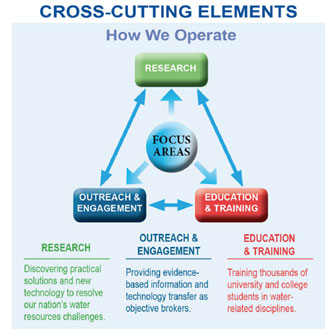The 104(g) program is a national competition in which the US Geological Survey (USGS), in cooperation with the National Institutes of Water Resources (NIWR), releases a request for pre-proposals around the first of November of each year. Unique characteristics of this program include:
- Research priorities are set jointly by the National Institutes for Water Resources and the US Geological Survey.
- The program focuses on regional and interstate water resources problems beyond those of concern only to a single state.
- All federal funds must be matched by at least one non-federal dollar for each federal dollar.

In 2018, the USGS established an NIWR committee to engage in collaborative visioning to guide the program and activities of its 54 university-based state institutes over the next 10 years. Specifically, the committee identified the following key vision focus areas, and new proposals should align with these:
- Water Scarcity and Availability: Drivers and outcomes of water availability and demand are understood and addressed to sustain human and environmental needs.
- Water-Related Hazards and Climate Change: Extreme hydrologic events and the impacts of climate change are addressed.
- Water Quality and Human Health: High-quality water that is safe and accessible for humans and ecosystems is assured.
- Water Policy, Planning, and Socioeconomics: Policy, planning, and socioeconomics are integrated and applied toward the comprehensive management and governance of water resources.
- Watershed and Ecosystem Function: Watershed and ecosystem functions are conserved to support and revitalize ecosystem services.
- Water Technology and Innovation: State-of-the-art water technology and innovation are advanced to meet societal and ecosystem water-related needs.
- Workforce Development and Water Literacy: A diverse workforce equipped to address our nation’s water resources needs is achieved in concert with greater public understanding of water resources.
104(g) proposals must be submitted through a Water Research Institute or Center. Projects can be up to three years in duration, and may request up to $250,000 in federal funds. Successful applicants must match each dollar of the federal grant with one dollar from non-federal sources.
 Key components of a successful pre-proposal project include:
Key components of a successful pre-proposal project include:
- A project that addresses a regionally (interstate) relevant and important water issue;
- A project that includes a USGS partner. The USGS partner does not have to be the state or regional office. It is best to include an USGS researcher with experience in the area you are proposing. This is key and worth 25 points out of 100 during the review.
- A project with scientific merit. Can the project be feasibly completed? Does the research team have the necessary experience to successfully complete the project? Expected results and the benefits to the regional stakeholders need to be clearly described.
- A project with a well-described plan to transfer the information to the stakeholders, and what training is proposed. Training can be student support or assisting an early-career investigator. The key is to state that you are providing training for the next generation of researchers and policy makers. This is worth another 25 points in the pre-proposal review process.
Additional information, along with a list of projects funded in the past, is available at: https://water.usgs.gov/wrri/national-competitive-grants.php.
A Tennessee institute has not been awarded a 104(g) grant in recent history. We would like to see a successful 104(g) grant this coming year and TNWRRC is ready to help. For more information or if you have questions, contact TNWRRC’s director, Dr. John Schwartz.